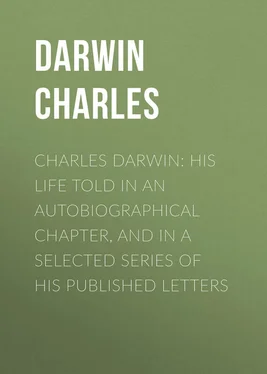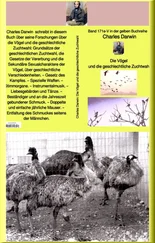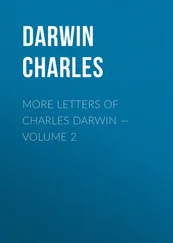Charles Darwin - Charles Darwin - His Life Told in an Autobiographical Chapter, and in a Selected Series of His Published Letters
Здесь есть возможность читать онлайн «Charles Darwin - Charles Darwin - His Life Told in an Autobiographical Chapter, and in a Selected Series of His Published Letters» — ознакомительный отрывок электронной книги совершенно бесплатно, а после прочтения отрывка купить полную версию. В некоторых случаях можно слушать аудио, скачать через торрент в формате fb2 и присутствует краткое содержание. Жанр: foreign_antique, foreign_prose, на английском языке. Описание произведения, (предисловие) а так же отзывы посетителей доступны на портале библиотеки ЛибКат.
- Название:Charles Darwin: His Life Told in an Autobiographical Chapter, and in a Selected Series of His Published Letters
- Автор:
- Жанр:
- Год:неизвестен
- ISBN:нет данных
- Рейтинг книги:5 / 5. Голосов: 1
-
Избранное:Добавить в избранное
- Отзывы:
-
Ваша оценка:
- 100
- 1
- 2
- 3
- 4
- 5
Charles Darwin: His Life Told in an Autobiographical Chapter, and in a Selected Series of His Published Letters: краткое содержание, описание и аннотация
Предлагаем к чтению аннотацию, описание, краткое содержание или предисловие (зависит от того, что написал сам автор книги «Charles Darwin: His Life Told in an Autobiographical Chapter, and in a Selected Series of His Published Letters»). Если вы не нашли необходимую информацию о книге — напишите в комментариях, мы постараемся отыскать её.
Charles Darwin: His Life Told in an Autobiographical Chapter, and in a Selected Series of His Published Letters — читать онлайн ознакомительный отрывок
Ниже представлен текст книги, разбитый по страницам. Система сохранения места последней прочитанной страницы, позволяет с удобством читать онлайн бесплатно книгу «Charles Darwin: His Life Told in an Autobiographical Chapter, and in a Selected Series of His Published Letters», без необходимости каждый раз заново искать на чём Вы остановились. Поставьте закладку, и сможете в любой момент перейти на страницу, на которой закончили чтение.
Интервал:
Закладка:
From September 1854 I devoted my whole time to arranging my huge pile of notes, to observing, and to experimenting in relation to the transmutation of species. During the voyage of the Beagle I had been deeply impressed by discovering in the Pampean formation great fossil animals covered with armour like that on the existing armadillos; secondly, by the manner in which closely allied animals replace one another in proceeding southwards over the Continent; and thirdly, by the South American character of most of the productions of the Galapagos archipelago, and more especially by the manner in which they differ slightly on each island of the group; none of the islands appearing to be very ancient in a geological sense.
It was evident that such facts as these, as well as many others, could only be explained on the supposition that species gradually become modified; and the subject haunted me. But it was equally evident that neither the action of the surrounding conditions, nor the will of the organisms (especially in the case of plants) could account for the innumerable cases in which organisms of every kind are beautifully adapted to their habits of life – for instance, a woodpecker or a tree-frog to climb trees, or a seed for dispersal by hooks or plumes. I had always been much struck by such adaptations, and until these could be explained it seemed to me almost useless to endeavour to prove by indirect evidence that species have been modified.
After my return to England it appeared to me that by following the example of Lyell in Geology, and by collecting all facts which bore in any way on the variation of animals and plants under domestication and nature, some light might perhaps be thrown on the whole subject. My first note-book was opened in July 1837. I worked on true Baconian principles, and without any theory collected facts on a wholesale scale, more especially with respect to domesticated productions, by printed enquiries, by conversation with skilful breeders and gardeners, and by extensive reading. When I see the list of books of all kinds which I read and abstracted, including whole series of Journals and Transactions, I am surprised at my industry. I soon perceived that selection was the keystone of man's success in making useful races of animals and plants. But how selection could be applied to organisms living in a state of nature remained for some time a mystery to me.
In October 1838, that is, fifteen months after I had begun my systematic enquiry, I happened to read for amusement Malthus on Population , and being well prepared to appreciate the struggle for existence which everywhere goes on from long-continued observation of the habits of animals and plants, it at once struck me that under these circumstances favourable variations would tend to be preserved, and unfavourable ones to be destroyed. The result of this would be the formation of new species. Here, then, I had at last got a theory by which to work; but I was so anxious to avoid prejudice, that I determined not for some time to write even the briefest sketch of it. In June 1842 I first allowed myself the satisfaction of writing a very brief abstract of my theory in pencil in 35 pages; and this was enlarged during the summer of 1844 into one of 230 pages, which I had fairly copied out and still possess.
But at that time I overlooked one problem of great importance; and it is astonishing to me, except on the principle of Columbus and his egg, how I could have overlooked it and its solution. This problem is the tendency in organic beings descended from the same stock to diverge in character as they become modified. That they have diverged greatly is obvious from the manner in which species of all kinds can be classed under genera, genera under families, families under sub-orders, and so forth; and I can remember the very spot in the road, whilst in my carriage, when to my joy the solution occurred to me; and this was long after I had come to Down. The solution, as I believe, is that the modified offspring of all dominant and increasing forms tend to become adapted to many and highly diversified places in the economy of nature.
Early in 1856 Lyell advised me to write out my views pretty fully, and I began at once to do so on a scale three or four times as extensive as that which was afterwards followed in my Origin of Species ; yet it was only an abstract of the materials which I had collected, and I got through about half the work on this scale. But my plans were overthrown, for early in the summer of 1858 Mr. Wallace, who was then in the Malay archipelago, sent me an essay On the Tendency of Varieties to depart indefinitely from the Original Type ; and this essay contained exactly the same theory as mine. Mr. Wallace expressed the wish that if I thought well of his essay, I should send it to Lyell for perusal.
The circumstances under which I consented at the request of Lyell and Hooker to allow of an abstract from my MS., together with a letter to Asa Gray, dated September 5, 1857, to be published at the same time with Wallace's Essay, are given in the Journal of the Proceedings of the Linnean Society , 1858, p. 45. I was at first very unwilling to consent, as I thought Mr. Wallace might consider my doing so unjustifiable, for I did not then know how generous and noble was his disposition. The extract from my MS. and the letter to Asa Gray had neither been intended for publication, and were badly written. Mr. Wallace's essay, on the other hand, was admirably expressed and quite clear. Nevertheless, our joint productions excited very little attention, and the only published notice of them which I can remember was by Professor Haughton of Dublin, whose verdict was that all that was new in them was false, and what was true was old. This shows how necessary it is that any new view should be explained at considerable length in order to arouse public attention.
In September 1858 I set to work by the strong advice of Lyell and Hooker to prepare a volume on the transmutation of species, but was often interrupted by ill-health, and short visits to Dr. Lane's delightful hydropathic establishment at Moor Park. I abstracted the MS. begun on a much larger scale in 1856, and completed the volume on the same reduced scale. It cost me thirteen months and ten days' hard labour. It was published under the title of the Origin of Species , in November 1859. Though considerably added to and corrected in the later editions, it has remained substantially the same book.
It is no doubt the chief work of my life. It was from the first highly successful. The first small edition of 1250 copies was sold on the day of publication, and a second edition of 3000 copies soon afterwards. Sixteen thousand copies have now (1876) been sold in England; and considering how stiff a book it is, this is a large sale. It has been translated into almost every European tongue, even into such languages as Spanish, Bohemian, Polish, and Russian. It has also, according to Miss Bird, been translated into Japanese, 40 40 Miss Bird is mistaken, as I learn from Professor Mitsukuri. – F. D.
and is there much studied. Even an essay in Hebrew has appeared on it, showing that the theory is contained in the Old Testament! The reviews were very numerous; for some time I collected all that appeared on the Origin and on my related books, and these amount (excluding newspaper reviews) to 265; but after a time I gave up the attempt in despair. Many separate essays and books on the subject have appeared; and in Germany a catalogue or bibliography on "Darwinismus" has appeared every year or two.
The success of the Origin may, I think, be attributed in large part to my having long before written two condensed sketches, and to my having finally abstracted a much larger manuscript, which was itself an abstract. By this means I was enabled to select the more striking facts and conclusions. I had, also, during many years, followed a golden rule, namely, that whenever a published fact, a new observation or thought came across me, which was opposed to my general results, to make a memorandum of it without fail and at once; for I had found by experience that such facts and thoughts were far more apt to escape from the memory than favourable ones. Owing to this habit, very few objections were raised against my views which I had not at least noticed and attempted to answer.
Читать дальшеИнтервал:
Закладка:
Похожие книги на «Charles Darwin: His Life Told in an Autobiographical Chapter, and in a Selected Series of His Published Letters»
Представляем Вашему вниманию похожие книги на «Charles Darwin: His Life Told in an Autobiographical Chapter, and in a Selected Series of His Published Letters» списком для выбора. Мы отобрали схожую по названию и смыслу литературу в надежде предоставить читателям больше вариантов отыскать новые, интересные, ещё непрочитанные произведения.
Обсуждение, отзывы о книге «Charles Darwin: His Life Told in an Autobiographical Chapter, and in a Selected Series of His Published Letters» и просто собственные мнения читателей. Оставьте ваши комментарии, напишите, что Вы думаете о произведении, его смысле или главных героях. Укажите что конкретно понравилось, а что нет, и почему Вы так считаете.












